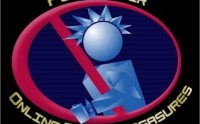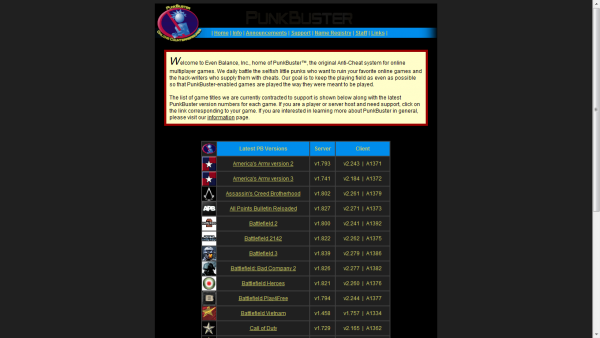When I booted up Battlefield 3 for the first time, I was very impressed by the level of polish present. Despite its browser-based setup, the interface was incredibly fluid and easy to navigate, and I found myself awestruck at how simple it was to complete basic functions like joining a friend or finding a game. “This is how a multiplayer-focused game should present itself in 2011”, I thought to myself, as I joined a server and prepared to enter a massive 64-player war zone.
After the map finished loading and I selected my class, I was immediately plopped into the conflict. I ran to the nearest tank with my squad and manned the gun of the vehicle. As we triumphantly drove into battle, the screen suddenly went dark, and I was kicked back to the server browser with an all too familiar message starkly painted across the screen: “You have been kicked by PunkBuster.”
As an avid PC gamer, I am well-acquainted with this grim statement. From America’s Army to Bad Company 2, PunkBuster has done its best (or its worst) to prevent me from accessing my games. It’s generally required a visit to the games’ respective forums in order to hunt down the latest post about PunkBuster not working, download several files, place them in the correct directory, and tweak some of the coding in the game. In more extreme cases, I’ve been forced to make adjustments to the BIOS on my computer or the ports on my router, and every once in a while, I’ll find a game that just won’t run, despite any directions I follow or previous tactics I employ.
Back in the early 2000s, this was still somewhat acceptable. It was more than expected that buying a new game could result in hours of tweaking and fiddling to achieve an optimal experience. Patches, driver hot fixes, and user-made tweaks were the order of the day. Occasionally you’d even have to downgrade to a previous version of a game, or reinstall it entirely. These were the sorts of things you would have to put up with in order to enjoy your game properly.
However, things have come a long way since the early days of the WON network and Sierra On-Line. Direct download clients like Steam and Desura have created a standard where the developers and games take care of the technical issues for the gamers. Patches automatically download to the computer as soon as they are made available, allowing every player to be on the same version at all times. Many games automatically detect what hardware you have under the hood and adjust visual settings by themselves, attempting to give the best experience possible with little hassle from the consumer. With easily accessible “Help” functions and forums managed by the developers, the solution to any problem is only a few clicks away.
With all this streamlining and simplification of the end user’s experience, PunkBuster still sticks out like a sore thumb. To solve the problems I was having with Battlefield 3, I had to visit PunkBuster’s website (which appears to be stuck in the ‘90s), click on Battlefield 3, and download a web page (yes, a web page) to my computer. I then had to navigate through layers of folders and drop the web page into the correct PunkBuster folder.
I know what you’re thinking; you’re probably convinced that I’m making mountains out of mole hills here, and that the issue really isn’t that bad. After all, the problem was easily solved by following the instructions DICE gave on the official forums. It only involved going to a website, downloading a specific file, and placing it in the right folder. Why should something with such an easy solution be picked apart? Well, like I said, we’ve come a long way. Unfortunate problems like this should be solved by the developers themselves with a patch or two. And in the patch department, EA and DICE have been on the spot with issues that plague the game itself. But for whatever reason, they’ve been forced to direct us to a specific site in order to solve the problem with PunkBuster ourselves. In this particular case, it’s been made clear that PunkBuster itself is the weakest link in the chain, and we are meant to deal with them when things go wrong with the client.
As an anti-cheating client, PunkBuster is rendered mostly ineffective (more on that below). And for the rest of us who just want to play the game, PunkBuster serves as an unfortunate obstacle by frequently kicking people without any legitimate reason. The solution seems painfully obvious: either PunkBuster gets its act together by providing sufficient anti-cheating protection and a client that won’t randomly kick innocent players out, or the infamous client is replaced with another third-party or in-house solution. In an industry where streamlining and consumer convenience are the orders of the day, PunkBuster in its current form has no business here.
Declan Murphy, writer for PXOD and experienced server administrator, shares his thoughts on the PunkBuster service:
“For server admins, I’ve found PunkBuster has been generally OK to work with. There are times when PB will release a server update and be really slow with releasing the client update to go along with it, and that often means you don’t get the traffic to your server. The functions of PunkBuster are good when they work, but I’ve learned to not rely on them over the years. I’d never run a server with just PunkBuster alone. Without signing up to a master ban list, you’re essentially pissing in the wind. Maybe 1 or 2 hackers every month will get kicked from your server officially by PunkBuster, but you’ll probably have another 10 enjoy their “gaming” in that same space of time. PunkBuster is like the scaffolding of a building. It’s a good base to work from but you still need your brick and mortar. The biggest problems PunkBuster has are on the client-side and these are often as a result of its heuristic analysis, which is great for admins as it improves the chances a hacker will be detected, but sucks for the end-user who probably just has some perfectly benign file with which PunkBuster has decided to take issue. Given the choice though, I’d still choose PunkBuster over VAC as an admin because with the master ban lists, it can be a very effective tool.”
Players and server admins agree; PunkBuster is an outdated nuisance that struggles to maintain relevancy today. With several publishers and developers constructing their own anti-cheating measures, it’s ultimately up to PunkBuster to either step up their game or fade into obscurity.


Man, I hate having to use PB. It STILL insists that the steam overlay is a “3rd party cheating program”, even when BF2 is SOLD ON STEAM.
-sixrocket